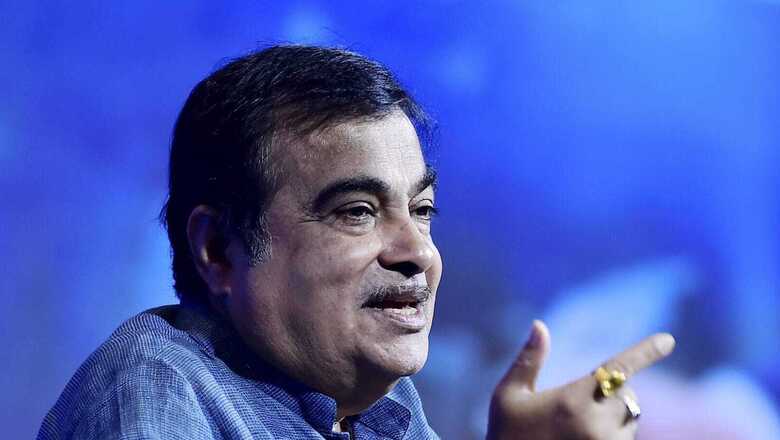
views
Road transport and highway minister Nitin Gadkari had said that road safety is the top priority since India witnesses 5 lakh road accidents per year resulting in a loss of 3.14% of the GDP and the 70% of the deaths are from the age group of 18-40 years.
At the Safety Pioneers Conference, organised by Intel in New Delhi on June 27, the Union minister said, “Our target is to reduce deaths by 50% by 2025”.
Several industry experts were present at the event among which Satyakam Arya, MD and CEO of the Daimler India Commercial Vehicles; Sanjeev Mantri, Executive Director at ICICI Lombard; Venkatesh Tewari, Director-Middle Mile Operations, Amazon India; and Piyush Tewari, Founder of SaveLIFE Foundation had talked about adoption of technology for road safety.
However, Gadkari also highlighted that in terms of road safety there are three major factors which are important, and these are “safer vehicles, safer roads and safer drivers”.
He also noted that to achieve the road safety target implementation of Artificial Intelligence (AI) is important as well as the new technologies which are already available.
Gadkari also suggested the adoption of digital technology in four ways, and these are engineering (including road and vehicle engineering) enforcement, education and emergency medical services.
During the event, Nivruti Rai, Country Head, Intel India, and Vice President, Intel Foundry Services said the minister has asked to take the goal to reduce collisions to zero by 2030.
It is noteworthy that the conference has brought together eminent companies from the fields of government, academia, technology, and transportation to work together and find solutions to issues relating to road safety.
According to Intel, the partnership will work as a catalyst to not only save lives on roadways but also to promote local ideas thanks to their distinctive experiences and abilities.
Rai said: “Advanced technologies such as AI are playing a transformational role in enabling smarter and safer vehicles, roads, transportation systems and drivers.”
“Intel along with its ecosystem partners from the government, industry and academia has been relentlessly working towards leveraging the power of technology to help achieve India’s road safety goals. And this conference further extends the commitment by bringing together critical players to collaborate, innovate and advance road safety for India,” she added.
Intel’s Initiative
India is responsible for 11% of the estimated world share of 1.35 million road accident fatalities. It has the highest number of reported official road crash fatalities (WHO-2018).
As India improves its road safety record, AI is expected to play a transformative role in enabling smarter and safer roads and drivers.
So, Intel has showcased its Onboard Fleet Services (“Solution”), an AI-powered fleet safety solution for commercial vehicles, to emphasise its commitment to employing technology to improve road safety.
This comprehensive ‘Solution’, the first of its type, brings world-class and time-tested technology specifically built for Indian conditions.
It includes features such as Collision Avoidance Systems (CAS), Driver Monitoring Systems (DMS), fleet telematics, fleet health, and fuel efficiency.
The ‘Solution’ has already been deployed by 16 customers, including Sure Group Logistics, Sankyu India Logistics, and Allanasons, in sectors such as HAZMAT, Cold Chain, Third-Party Logistics (3PL), and Employee Transport, and it indicates that this technology can reduce the probability of accidents by 40-60% and estimates that overall efficiency losses can be reduced by up to 50%.
It is driven by a portfolio of in-cabin gadgets as well as a cutting-edge cloud site that provides fleet managers with actionable insights, analytics, and reports. The Solution also comprises Mobileye’s best-in-class ADAS, a world leader in AI-based collision avoidance systems.
The Intel Onboard Fleet Services cloud portal product, with its integrated offering, can assist enhance overall efficiency, enable preventive maintenance, and save operating expenses.
Furthermore, Intel believes that by implementing the Solution, public-sector transportation firms might realise significant economic benefits from reduced accident compensation payouts.
Solutions also include advanced telematics, which include vehicle health and fuel analytics, as well as a one-of-a-kind driver scoring and rating module.
“This can significantly help fleets reduce the risk of accidents and downtime while encouraging good driving practices through targeted incentivization and reward programs,” the company stated.
It is also noteworthy that the ‘Solution’ is built around driver coaching, which uses 15 different inputs to deliver individualised coaching recommendations for commercial fleets, who can lose up to 25 workdays each accident.
While explaining the cause behind the initiative, Intel said: “Now, more than ever, it is imperative for technology and transportation providers, vehicle makers, academia, and government to form alliances and work in a cohesive manner to find the root cause and address the problem of road safety.”
“A safety-first mindset can significantly advance the Ministry of Road Transport and Highways’ goal of reducing the number of road accidents and fatalities by 50% by 2025, while also providing commercial fleet operators a business edge via efficiencies gained. Moreover, tapping the capabilities of advanced technologies such as ADAS, IoT, etc. can drive significant operational efficiencies, add local innovations for the Indian fleet market, and save lives on roads,” it added.
Read all the Latest News , Breaking News , watch Top Videos and Live TV here.
















Comments
0 comment